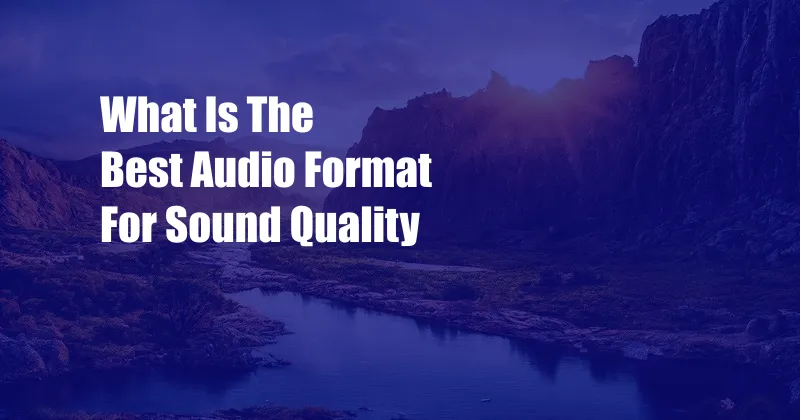
What is the Best Audio Format for Sound Quality?
Music has always been an integral part of my life. I remember spending hours listening to my favorite songs as a child, and I still enjoy it today. Over the years, I’ve come to appreciate different types of music and audio formats. However, one question that always lingers in my mind is: What is the best audio format for sound quality?
In this article, I’ll explore the different audio formats available and discuss their relative advantages and disadvantages. I’ll help you understand the technical aspects of audio quality and provide tips on choosing the best format for your needs.
Audio Quality: A Primer
Before we dive into the different audio formats, let’s first understand what audio quality is and what factors affect it.
Audio quality refers to the fidelity of the sound reproduction. It encompasses several factors, including:
- Sampling rate: The number of times per second that the sound is sampled. A higher sampling rate results in a more accurate representation of the original sound.
- Bit depth: The number of bits used to represent each sample. A higher bit depth allows for a wider range of sound levels and reduces distortion.
- Audio codec: The algorithm used to compress the audio data. Different codecs have different compression ratios and sound quality.
Types of Audio Formats
There are numerous audio formats available, each with its own unique characteristics. Some of the most common formats include:
- WAV (Waveform Audio File Format): A lossless format that provides the highest possible audio quality. However, WAV files are uncompressed and can be quite large.
- FLAC (Free Lossless Audio Codec): A lossless format that offers the same audio quality as WAV but with a smaller file size.
- AIFF (Audio Interchange File Format): A lossless format similar to WAV but primarily used with Apple devices.
- MP3 (MPEG-1 Audio Layer 3): A lossy format that reduces file size by discarding some audio data. MP3 is widely supported and offers a good balance of sound quality and file size.
- AAC (Advanced Audio Coding): A lossy format that offers better sound quality than MP3 at similar file sizes.
- Ogg Vorbis: A lossy format that is open-source and free to use. Ogg Vorbis offers comparable sound quality to MP3 but with a smaller file size.
- ALAC (Apple Lossless Audio Codec): A lossless format developed by Apple that is similar to FLAC.
Choosing the Best Audio Format
The best audio format for you will depend on your specific needs and requirements. Here are some factors to consider:
- Sound quality: If you demand the highest possible sound quality, choose a lossless format like WAV or FLAC.
- File size: Lossless formats produce large file sizes. If file size is a concern, consider a lossy format like MP3 or AAC.
- Compatibility: Some audio formats are more widely supported than others. If you need to play your audio on various devices, choose a format that is widely supported.
Tips for Choosing Tips from Expert
Here are some tips from experts to help you choose the best audio format for your needs:
- Use lossless formats for critical listening. If you are an audiophile or want to listen to music with the highest possible sound quality, use a lossless format like WAV or FLAC.
- Choose lossy formats for portable devices. Lossy formats like MP3 or AAC are more suitable for portable devices due to their smaller file size.
- Convert your music to different formats. If you want to have the best of both worlds, consider converting your music to different formats. For example, you can keep a lossless copy of your music for critical listening and a lossy copy for portable use.
FAQ
Here are some frequently asked questions about audio formats:
- Q: What is the difference between lossless and lossy formats?
A: Lossless formats preserve all the audio data, while lossy formats discard some data to reduce file size. - Q: Which audio format is the best?
A: The best audio format depends on your needs. Lossless formats offer the highest sound quality, while lossy formats offer a good balance of sound quality and file size. - Q: Can I convert audio formats?
A: Yes, you can convert audio formats using software or online tools.
Conclusion
Choosing the right audio format for your needs can significantly impact your listening experience. By understanding the different audio formats available and considering factors like sound quality, file size, and compatibility, you can make an informed decision.
I encourage you to explore different audio formats and experiment with the suggestions I have provided. Let me know if you have any questions or want to share your experiences with different audio formats in the comments section below.